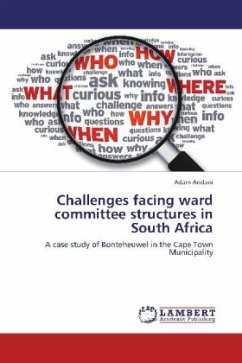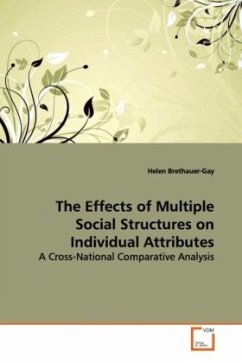
Challenges facing ward committee structures in South Africa
A case study of Bonteheuwel in the Cape Town Municipality
Versandkostenfrei!
Versandfertig in 6-10 Tagen
45,99 €
inkl. MwSt.

PAYBACK Punkte
23 °P sammeln!
Central to the project of participatory local governance and democracy in South Africa is the Ward Committee System. Backed by an impressive legal framework, ward committees are mandated to act as vehicles of communication between communities and the political administrative structures of municipalities. Thus ward committees are envisaged to play critical roles in promoting local democracy, articulating the needs, challenges and priorities of communities and towards achieving the overall objective of a developmental local government in South Africa. However, since its inception in 2000, the wa...
Central to the project of participatory local governance and democracy in South Africa is the Ward Committee System. Backed by an impressive legal framework, ward committees are mandated to act as vehicles of communication between communities and the political administrative structures of municipalities. Thus ward committees are envisaged to play critical roles in promoting local democracy, articulating the needs, challenges and priorities of communities and towards achieving the overall objective of a developmental local government in South Africa. However, since its inception in 2000, the ward system has rarely produced the melting-pot effect that is needed to ensure that ordinary people are able to exert control and influence over governments decisions that impact on their wellbeing. It would seem that many municipalities are failing to comply with expectations. Against this backdrop this research was aimed at investigating the challenges facing the ward committee system as a conduit for grassroots participation using Bonteheuwel (ward 50) as a case study. The findings therefore reflect practical challenges and experiences of members in this case.












